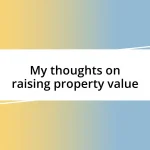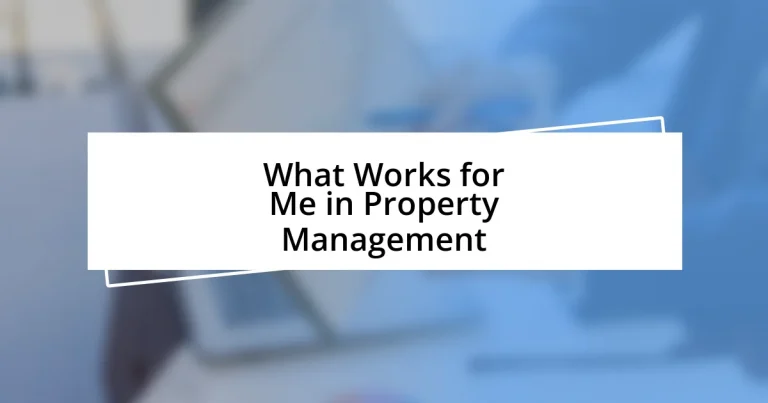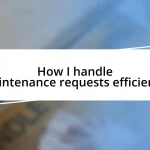Key takeaways not available due to an error.
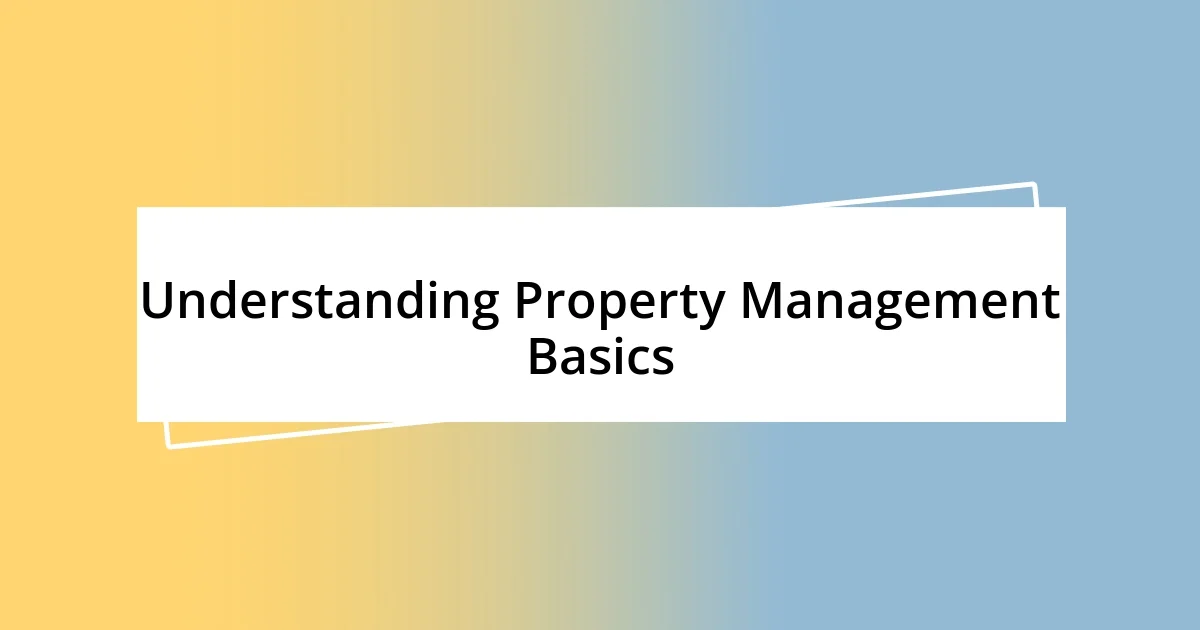
Understanding Property Management Basics
Property management is not just about collecting rent; it’s a dynamic field that requires a deep understanding of various factors. I remember my early days in property management when I was overwhelmed by maintenance requests and tenant complaints. It was a crash course in multitasking, but I quickly learned that effective communication with tenants and prompt responses were the keys to building trust. Have you ever thought about how crucial it is to establish this rapport?
A solid grasp of tenant rights and landlord responsibilities can prevent many potential disputes. I once encountered a situation where a tenant felt unjustly treated over a late fee. By calmly reviewing the lease agreement together, we clarified expectations and avoided a possible eviction process. It reinforced for me that transparency isn’t just a best practice; it’s essential for a healthy landlord-tenant relationship.
Additionally, financial literacy is crucial in property management. I learned this the hard way when I under-budgeted for property maintenance one year, leading to unexpected costs. I now approach each property with a detailed budget plan, ensuring I allocate funds for both routine upkeep and unexpected repairs. How do you manage your financial forecast? Proper planning can make all the difference in creating a successful property management experience.
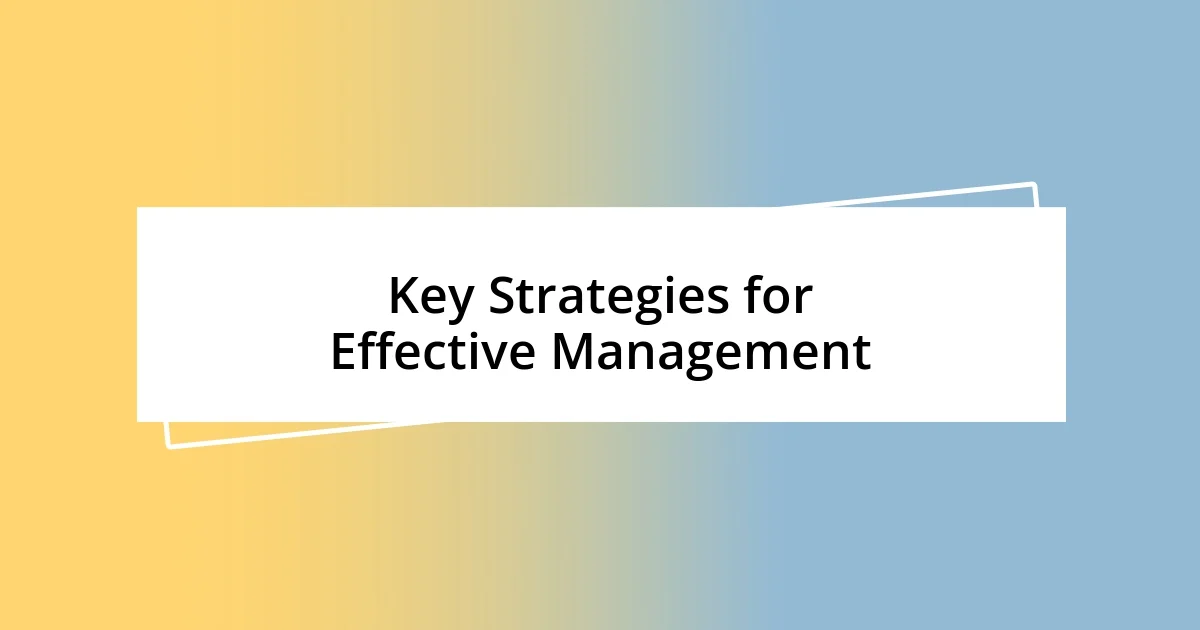
Key Strategies for Effective Management
Effective management goes beyond basic operational tasks; it involves a proactive approach to relationships and systems. For instance, I always prioritize regular property inspections. I remember walking through one of my properties and spotting a minor leak that could have escalated into a major issue if left unchecked. Addressing maintenance needs before they become problems not only saves money but also establishes a level of trust with tenants. This leads to a smoother living experience and fosters a sense of community.
To enhance my management strategy, I incorporate these key practices:
-
Regular Communication: I set a schedule for updates, be it through newsletters or social media groups for my tenants.
-
Feedback Mechanisms: Actively seeking tenant feedback has transformed my management style. I’ve implemented surveys, which led to changes in common areas that tenants were passionate about.
-
Technology Utilization: Employing property management software has streamlined processes for me. I can track maintenance requests, collect rents, and communicate all in one place, making my life much easier.
-
Personal Touch: I make it a point to do occasional tenant meet-and-greets. Building rapport on a more personal level has often turned short-term tenants into long-term residents.
By blending empathy with effective operational strategies, I’ve found that the management experience profoundly benefits everyone involved.
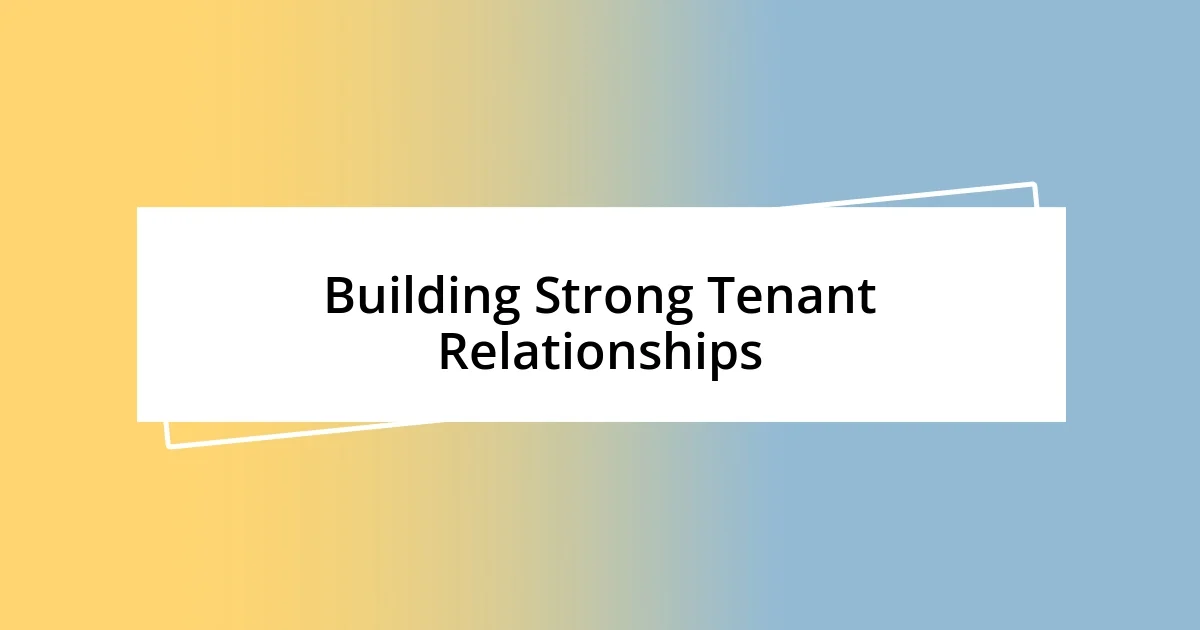
Building Strong Tenant Relationships
Building strong relationships with tenants can genuinely transform the entire rental experience. I recall a time when a tenant faced personal hardships, resulting in late payments. Instead of reacting with strictness, I chose to empathize with their situation. We sat down together, discussed their challenges, and I offered a temporary payment plan. This not only helped them feel understood but also fostered loyalty, as they felt I cared about their well-being, not just the rent check. Have you experienced the warmth that comes from such mutual respect?
To maintain these relationships, frequent communication is crucial. I’ve found that a simple monthly check-in call or email can make a world of difference. I often ask tenants how they’re enjoying the property or if they need any assistance. When one tenant indicated they wanted to change a light fixture, I took the time to discuss their ideas and then coordinated the installation. It might seem small, but this level of attentiveness kept the lines of communication open and built a foundation of trust that I deeply value.
Lastly, creating a sense of community within the property can significantly enhance tenant relationships. I’ve organized seasonal potlucks and holiday gatherings, allowing tenants to connect and share their experiences. I still remember the laughter and camaraderie from our last summer barbecue; it was a joy to watch neighbors become friends. I believe that building a community fosters harmony and encourages tenants to care for their surroundings, ultimately benefiting everyone involved.
| Practice | Benefit |
|---|---|
| Empathy and Understanding | Fosters loyalty and trust |
| Regular Check-ins | Keeps communication open |
| Community Engagement | Builds harmony and neighborly bonds |
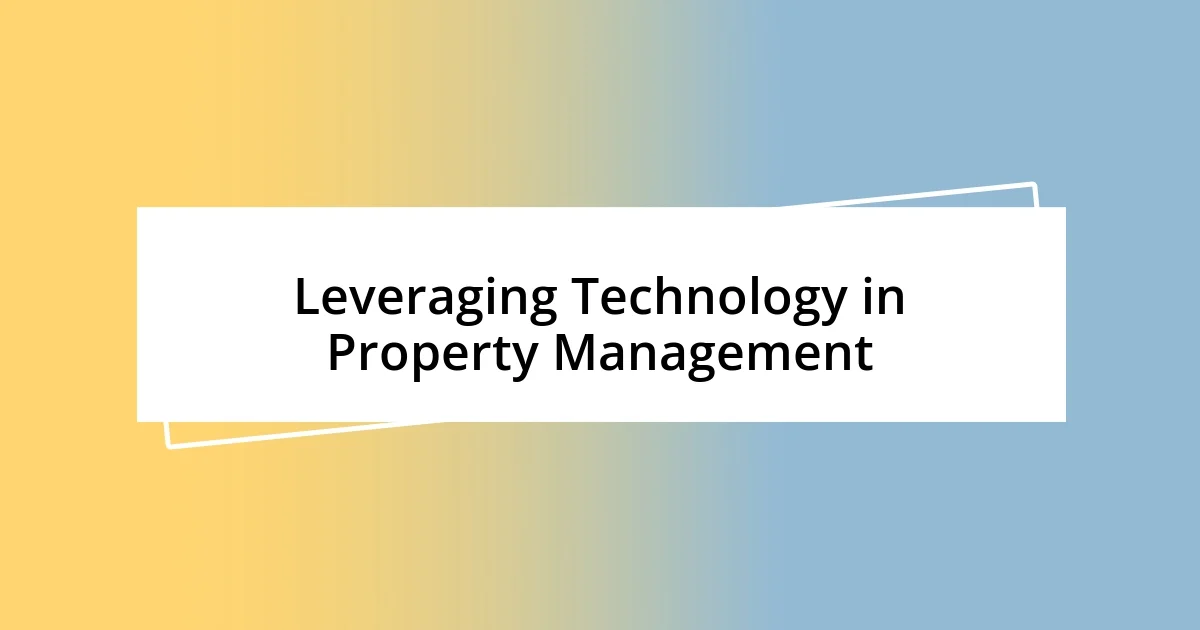
Leveraging Technology in Property Management
Leveraging technology in property management has been a game changer for me. The first time I integrated a property management app, I was amazed at how it transformed my workflow. Imagine having all crucial information at your fingertips—maintenance requests, tenant communication, and rental payments all neatly organized. It felt liberating! I found myself spending less time on administrative tasks and more on building relationships with my tenants.
One feature I particularly appreciate is the online tenant portal. I recall a tenant who had a pressing maintenance issue at midnight. Instead of waiting until morning to call me, they submitted a request through the portal, complete with photos. This not only resolved the problem swiftly but also reinforced to me how technology can empower both managers and tenants. How has technology made your day-to-day management easier?
I’ve also embraced data analytics offered by these software tools to inform my decision-making. There was a time when I struggled to determine optimal rental prices. By analyzing market trends and tenant preferences through the system, I was able to adjust prices effectively. This led to a notable increase in occupancy rates—talk about a win-win! Reflecting on this, it’s clear that leveraging technology not only enhances efficiency but can also significantly boost tenant satisfaction and retention.
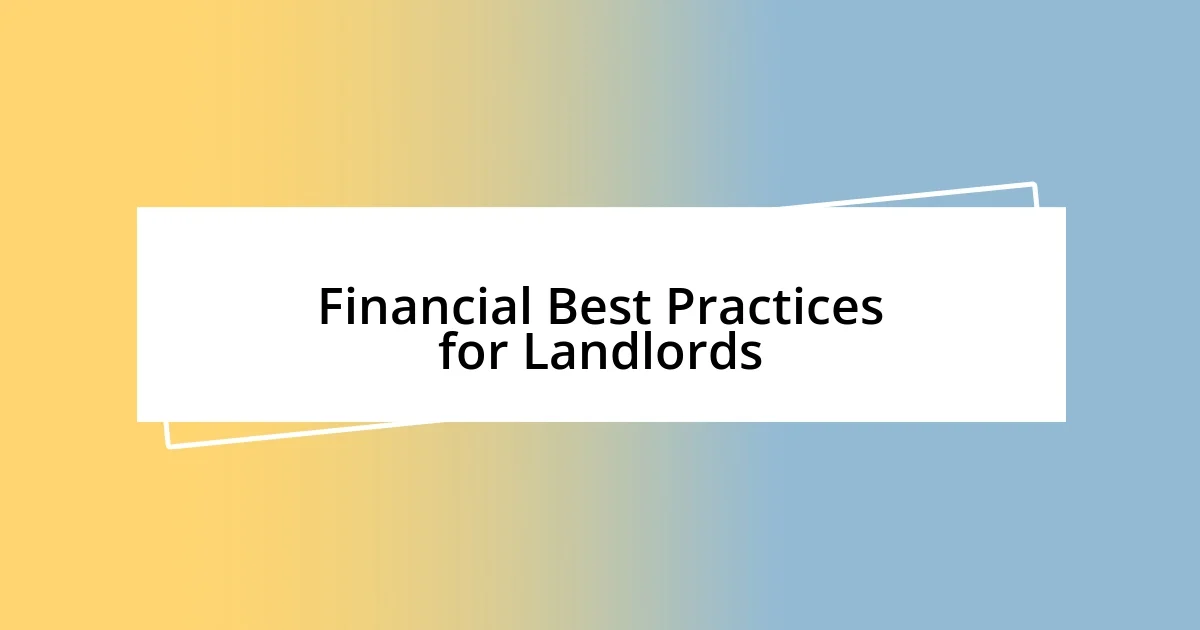
Financial Best Practices for Landlords
Financial management is the backbone of successful property management, and I’ve learned a few best practices over the years. First and foremost, I always set aside a portion of the rental income as a reserve fund for unexpected expenses. The reality is that maintenance issues can arise at the most inconvenient times, and having that financial cushion has saved me from panicking during emergencies. Have you ever experienced a sudden repair bill that threw off your budget?
Beyond reserving funds, I keep meticulous records of all income and expenses. I utilized simple accounting software, which made it easier to track everything from utility bills to maintenance costs. Once, I discovered an oversight that allowed me to reclaim an annual fee I wasn’t aware I was being charged. Trust me; the moment I saw that refund hit my account was incredibly satisfying. How often do you review your financial records, and are you aware of the hidden savings waiting for you?
Finally, I strongly believe in reviewing and adjusting rental rates annually. It can be a little daunting to raise rents, but I’ve learned that transparent communication with tenants about why the increase is necessary—like market trends and property improvements—can ease their concerns. I remember a particular year when I raised the rent modestly, supported by clear justification; many tenants even expressed gratitude for the enhancements we’d made. Have you had a similar experience wherein open communication made a situation easier to handle?
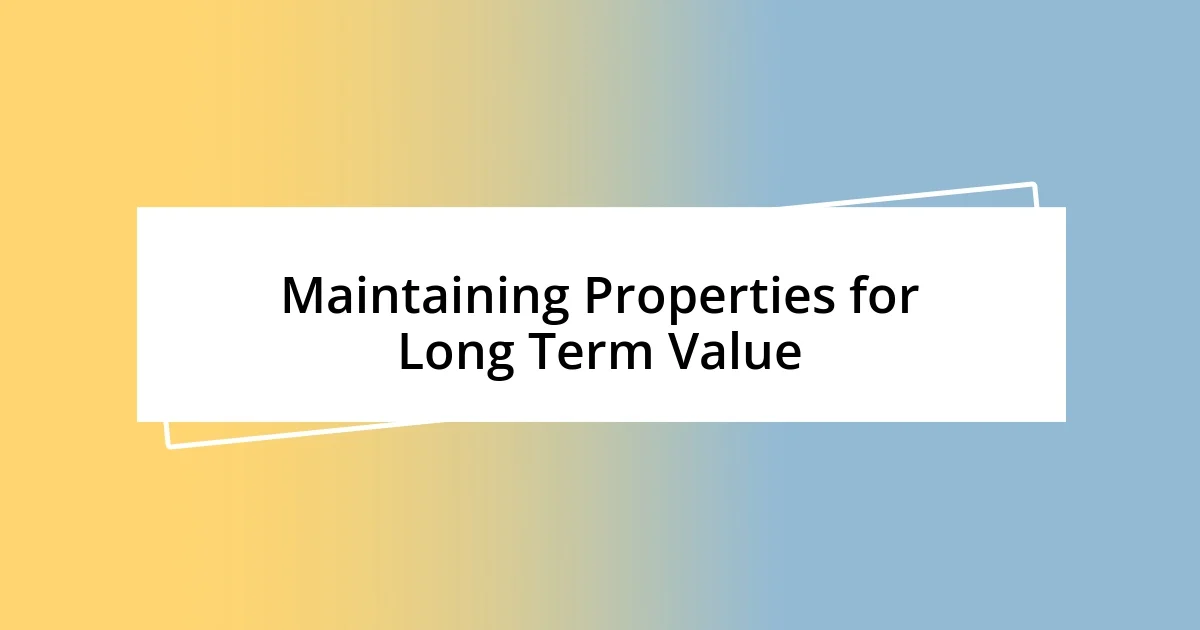
Maintaining Properties for Long Term Value
Maintaining properties for long-term value is something I’ve grown passionate about over the years. Regular inspections are key; I remember the first time I caught a small plumbing leak during a routine check. Addressing it early saved me from a much larger repair bill down the line. Have you ever faced a situation where ignoring a minor issue led to an expensive fix? I can assure you that staying proactive pays off.
Another aspect I’ve found invaluable is scheduled maintenance. I always create a yearly maintenance calendar covering essential tasks, like roof inspections and HVAC servicing. I once neglected an air conditioning service, and when summer arrived, I was faced with an emergency repair call on a sweltering day. It was a costly mistake, both financially and in terms of tenant satisfaction. Could you imagine the discomfort of your tenants waiting for a repair in the peak heat of summer? Trust me, a little planning goes a long way.
Additionally, investing in upgrades can significantly enhance a property’s long-term value. When I renovated an old kitchen in one of my units, it not only attracted high-quality tenants but also allowed me to increase the rental price. That upgrade alone considerably boosted the property’s market value. Have you thought about how a single enhancement could transform your property? It’s amazing to see how these thoughtful improvements can offer returns that far exceed the initial investment.
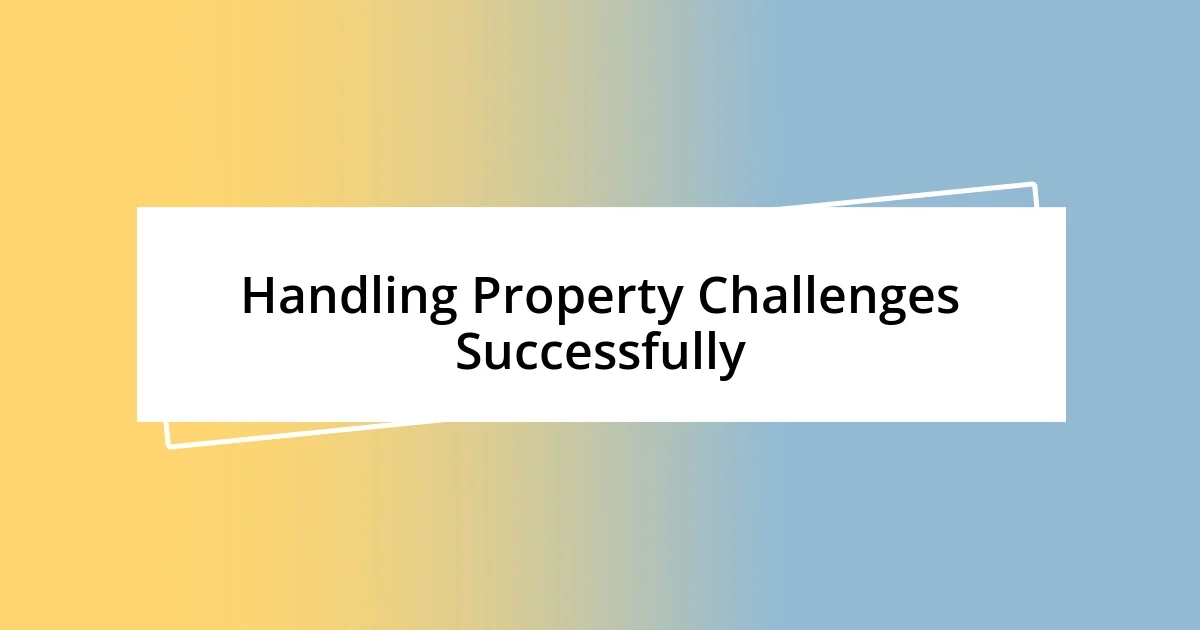
Handling Property Challenges Successfully
Handling property challenges requires a proactive mindset. I recall a time when a tenant called me at 11 PM about a broken heater in dead winter. Instead of panicking, I walked them through a few troubleshooting steps over the phone. Amazingly, that simple act of listening and guiding them helped resolve the issue until I could provide a full repair the next day. How often do we underestimate the power of communication in stressful situations?
Another key lesson I’ve learned is the importance of building strong relationships with reliable vendors. When I faced a major electrical issue, I called my usual electrician, who quickly prioritized my emergency. Having that connection made all the difference. It’s like having a trusted friend who knows your needs and can respond rapidly. Do you have partners in your property management network who can help you navigate challenges swiftly?
Lastly, I’ve found that cultivating patience is imperative. There was a time when a renovation project ran behind schedule due to unforeseen circumstances. Rather than letting frustration take over, I took it as an opportunity to connect more with my tenants, sharing updates and even getting feedback on design choices. This not only maintained their trust but also allowed them to feel more invested in their living space. Can you see the value in treating challenges as chances to strengthen relationships?








